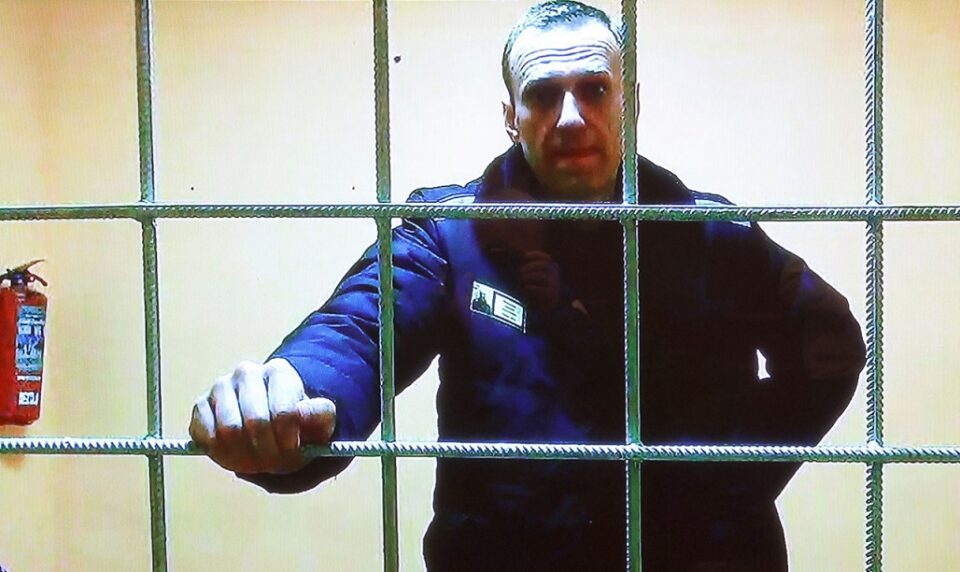Jailed Kremlin critic Alexei Navalny on Tuesday lost his legal appeal against a nine-year prison sentence that he and his allies condemn as politically motivated.
His sentencing came as Moscow pushes on with its military offensive in neighbouring Ukraine and Russian authorities seek to silence remaining government critics.
A Moscow court ruled to “leave the sentence without changes” and for it to enter into force immediately, meaning that the leader of Russia’s embattled opposition will be transferred to a strict-regime penal colony with harsh conditions, including few family visits.
President Vladimir Putin’s arch-critic appeared before the court via video-link from behind bars at his prison colony outside Moscow.
Wearing a black prisoner uniform, the 45-year-old looked grim and listened attentively, leaning against his bars, as the judge read out his sentence.
During the hearing, he dismissed his trial as “meaningless”, saying: “I despise your court, your system.”
“It’s you, your system and Putin who are traitors against the Russian people”, said Navalny.
“I am ready to sit in jail to prove that not everyone in Russia is like this.”
– ‘Burn in hell’ –
Navalny used his final words to condemn the Kremlin and its military campaign in Ukraine.
“What Putin is doing is pointless,” he said.
“One crazy thief has seized hold of Ukraine, and no one understands what he wants to do with it”.
“Your time will pass and you will burn in hell,” he concluded his speech.
In late March, Navalny had his jail time extended to nine years after he was found guilty of embezzling donations to his political organisations and contempt of court.
He was already serving two-and-a-half years in a prison around 100 kilometres (60 miles) east of Moscow for violating parole on old fraud charges.
The new sentence will replace the one he was handed in February 2021, meaning Navalny will remain behind bars for another eight years.
Navalny told the court that the judge who sentenced him last year had later passed him a message expressing her regrets, before dying in September.
– Prisoners ‘tortured’ –
The hearings started last week but Navalny was granted a week’s postponement so he could have a family visit.
His lawyer Olga Mikhailova told the court the sentence should be annulled as it is “unjust” and “contradicts international law”.
After the ruling, she said his legal team would appeal to the country’s constitutional court, focusing on the risk to Navalny of moving to a strict-regime colony.
“Alexei often said there was a threat to his life, so we will be going there,” she said.
Navalny’s press secretary, Kira Yarmysh, tweeted that “the place where he is to be transferred is notorious for its prisoners being tortured and killed”.
Navalny wrote on Telegram earlier this month that he heard Penal Colony No. 6 in the town of Melekhovo in the Vladimir region east of Moscow was being prepared for his arrival.
The location of his penal colony will be announced after his transfer.
Mikhailova warned that Navalny faces further criminal cases and while there have been “masses of international court rulings” in his favour, “nothing works, he’s still not freed”.
– Novichok poisoning –
Navalny rose to prominence as an anti-corruption blogger and, before his imprisonment, mobilised anti-government protests across Russia.
In 2020, he narrowly survived a poisoning attack with Novichok, a Soviet-designed military-grade nerve agent. Navalny accused Russian authorities, but the Kremlin denied any involvement.
He was arrested last year on his return from treatment in Germany, sparking widespread condemnation abroad and sanctions from Western capitals.
In 2018, he campaigned as a presidential candidate but was barred from running in the election that saw Putin secure a fourth term in power.
Navalny’s political organisations across the country have been declared “extremist” and shut down.
His key allies have fled Russia and several are wanted by Russian authorities on criminal charges.
Navalny’s team continues publishing investigations into the wealth of Russia’s elites that have garnered millions of views on YouTube.
A fly-on-the-wall documentary about Navalny is currently in cinemas worldwide.





